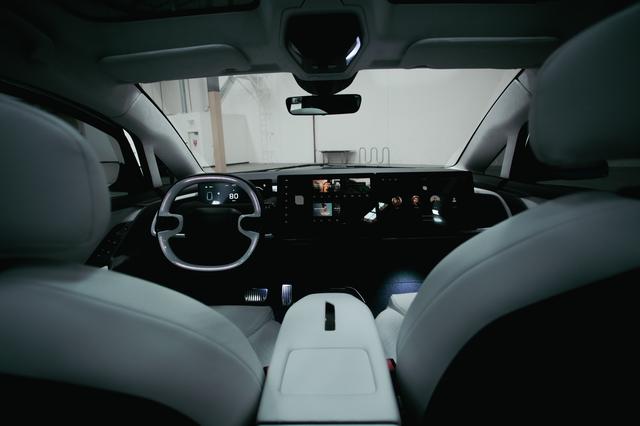IndiEV reveals electric car with a built-in gaming PC but not much else
There’s a new electric vehicle startup breaking cover in California, making bold claims and teasing pie-in-the-sky ideas while remaining guarded about its founder and origin story.
If that sounds familiar, it’s because it’s a story that’s been playing out on repeat the last half-decade. This time, it’s a company called IndiEV, which emerged from stealth mode Thursday with a small prototype electric car called the Indi One that it says will start at just $45,000 — a car it boldly says will launch at the end of 2022.
Parts of the script are the same: IndiEV wants to power the Indi One with a scalable lithium-ion battery pack (that can be adapted to fit more affordable or expensive models or future vehicles); It wants to take advantage of the extra room afforded by the simpler architecture of electric vehicles to do interesting things in the cabin; it blends a futuristic exterior with a somewhat minimalist interior.
But IndiEV diverges from that script in a few places, most notably in that it’s promising the top tier Indi One will be the “first vehicle to have an integrated supercomputer” onboard, which it says will power all sorts of gaming and entertainment applications inside the car — like what Tesla is doing with the new Model S.
When pushed on the details, IndiEV shared that this “supercomputer” is merely a custom Windows PC with an i7 processor and an Nvidia RTX2080 graphics card. That’s not even top-of-the-line hardware, let alone a package that could in any seriousness be called a “supercomputer.”
One of IndiEV’s marketing reps said during a Zoom briefing that the hope is that the dedicated rig can power “any triple-A game, any virtual reality game, any augmented reality game.” The company showed off what they said was a working, hand-built prototype of the vehicle that had two 15-inch touchscreens on the dash — one for the separate Linux-based vehicle information system and one for the PC under the hood — and illustrations of people using VR headsets in the back seat while being driven around.
The company’s reps talked about other funny uses, too, like filming drives with the interior and exterior cameras and then editing the footage and uploading it over — you guessed it — the car’s built-in 5G modem. At the very least, IndiEV’s claimed team of about 65 people has created an interesting engineering challenge for themselves, as the “supercomputer” is mounted under the car’s front hood. It’s packaged in a cooler-sized housing that will have to somehow withstand the radical temperature shifts and vibrations that come with driving a car — no easy feat.
Not only did IndiEV claim the car I saw during the briefing was a working prototype, but it says a supplier in South Korea has already built 12 prototype bodies-in-white (the steel structure that sits on top of the chassis) for the Indi One. IndiEV didn’t name any of its suppliers, though data from ImportYeti shows that it had at least one body-in-white delivered to the US from a South Korean company called Merit Inc., an electric motor delivered from China’s Jing-Jin Electric, and battery cells from Chinese supplier Eve Energy.

What, exactly, has been funding all these efforts for the last four years? IndiEV’s head of operations, John Kennedy, declined to say. But the startup was founded by a Chinese mobile game entrepreneur named Shi Hai, court documents and state filings show, who started a company called Snail Games a little more than a decade ago.
There may be a reason why he’s not front and center: Shi and his ventures have been sued three times over claims of racist behavior, poor treatment of employees, and in one case, wrongful termination and wage theft.
In 2014, one of the top executives at Snail Games’ US division David Runyan sued the company and Shi, claiming the founder discriminated against non-Chinese employees and made derogatory statements. He also said in his complaint that “working for Shi Hai was extraordinarily difficult as he was a volatile individual who would often make decisions based on raw emotions and snap judgments.” The suit was ultimately settled.
In 2019, IndiEV’s then-head of supply chain Shawn VanAmburg sued the company, Shi, and a number of other founding executives over similar claims. In one alleged interaction, Shi told VanAmburg to fire her male subordinates and hire Chinese women because “Chinese women like to shop and are better negotiators,” according to the complaint. VanAmburg also alleged a number of safety code violations at IndiEV’s Los Angeles, CA facility. Her case wound up in arbitration.
Also in 2019, a woman named Meng Hua Lee sued Snail Games, Shi, and other executives. She stated in her complaint that she worked as a “gopher” for Shi and his wife, Ying Zhou, who was also CFO of Snail Games. Meng was technically employed through the gaming company but said she worked much longer hours driving Shi and Ying around on “work and personal business,” picking up dry cleaning and “retrieving luxury items on their behalf,” caring for the couple’s children at their Beverly Hills mansion, shopping, making travel arrangements, conducting “internet research,” translating, making doctor appointments, cooking and cleaning, and more. Meng claimed she was “on call” for 24 hours a day.
The company allegedly had Meng do many of these tasks for another executive for a telecommunications company affiliated with Snail Games, too, on top of her work for Shi and Ying. When Meng tried to get compensated for what she believed should be considered overtime work, Snail Games allegedly bucked. Meng also alleged that Shi often treated her in “a hostile and disparaging manner,” including telling her not to have children because she would end up “dedicating her life” to him.
Meng started submitting time cards for what she believed were unpaid wages in 2019. In June of that year, “shortly after” she dropped off Shi at Los Angeles International Airport, she was fired over email. The two sides are still apparently working out a settlement agreement.
A spokesperson for the company said these lawsuits are “all frivolous” and that they have been resolved.
As for how IndiEV originally came together, it’s still not totally clear. Beyond Shi, some of the earliest employees included a former human resources manager from Faraday Future, as well as Miles Bernal, the man who once claimed in his own lawsuit to have run operations at the mansions Faraday Future founder Jia Yueting bought on the Pacific Ocean.
For what it’s worth, IndiEV is at least now trying to engage with the public about what it’s doing, as opposed to something like fellow California EV startup Alpha Motors, which has done nothing to date to prove it’s not some kind of joke or scam. But like many other EV startups to emerge from California in recent years know well —from Faraday Future to Fisker Inc. to Karma Automotive — IndiEV likely has an incredibly hard road ahead.








